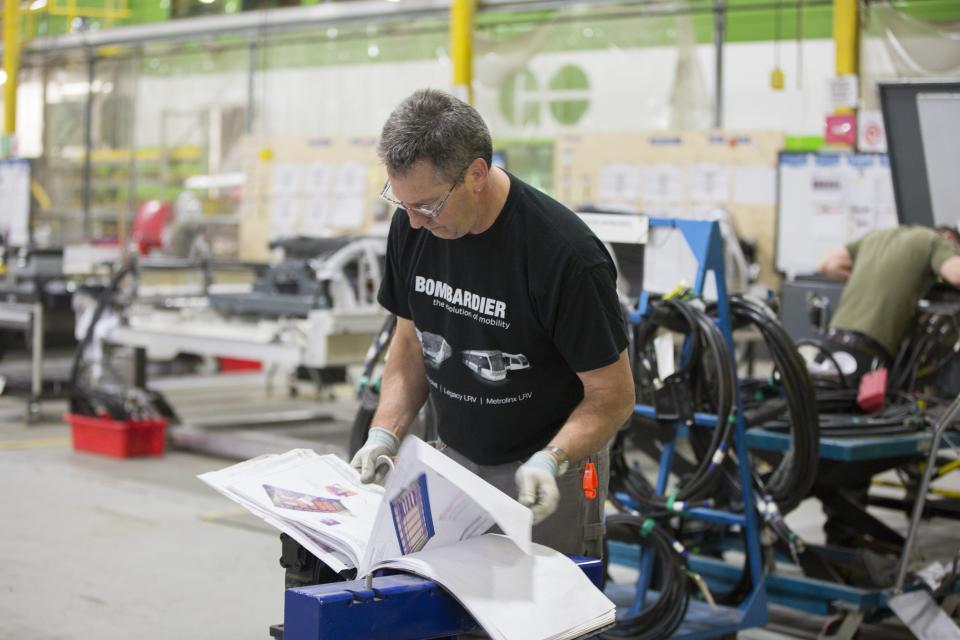'Scratching their backsides': Union, governments point blame for Bombardier layoffs

Bombardier Inc. says it will lay off 550 employees at its Thunder Bay, Ont. plant in November, pointing the blame at the expiration of two major contracts as well as Buy America policies in the United States.
The Quebec-based plane and train maker released a statement Wednesday confirming earlier reports about the layoffs, which will go into effect on Nov. 4.
“This decision is due to the cyclical nature of our business and the ramp down of our two high cadence programs,” Bombardier said.
“Today’s announcement is not an easy one, however, we remain hopeful that we can secure new work to ensure the commercial viability of the important presence of a northern manufacturing plant.”
The Thunder Bay facility, which currently employs about 1,100 workers, is where Bombardier produces streetcars for the Toronto Transit Commission, as well as trains for the Metrolinx GO system. Both Ontario transit programs are scheduled to wrap up within a few weeks of each other.
Bombardier said it reached out to the federal and provincial governments, as well as the City of Toronto, last fall to discuss the issue and ensure the layoffs “would not come as a surprise.”
While the Ontario government has committed to purchase an additional 36 trains for the Metrolinx GO program, Bombardier still does not have additional orders on the books to replace the existing work happening at the plant.
“We continue to work with our partners and the community to bring significant new contracts,” the company said.
Bombardier also said local content requirements in the United States have hurt the company’s ability to “fully leverage our Canadian manufacturing footprint and expertise.” The company specifically pointed to the Buy America Act, which will raise U.S. content requirements to 70 per cent by the fall.
“In 2019, to deal with a 70 per cent local content requirement threshold in the United States, a company like Bombardier has no choice but to have an American manufacturing footprint and supply chain,” the company said.
Federal, provincial leaders pointing fingers at each other
At the same time, the federal Liberal and Ontario Progressive Conservative governments exchanged jabs and blamed each other for the loss of jobs in Thunder Bay.
Federal Labour Minister Patty Hajdu released a statement saying Ontario Premier Doug Ford “sat on his hands” and failed to deliver new contracts for the province’s promised future transit projects. Ford fired back on Wednesday at a press conference in Saskatoon, saying that his government has put forward a $28.5-billion Toronto-area transit plan that could help keep the facility afloat, but he hasn’t “heard hide nor hair” about funding from Ottawa.
Unifor president Jerry Dias, who had met with Ford in June to discuss the future of the plant and its 1,100 unionized workers, said the Ontario government’s commitment to order an additional 36 trains is “a good start” but not enough for a facility that produced 163 trains in 2018. Dias said that all levels of government need to come together to finalize projects that could potentially save jobs at the plant and ensure its longterm viability.
“There is no way now to avoid these layoffs because everyone was scratching their backside instead of putting their heads together and resolving this issue,” he said in an interview.
“If there’s no plan, people aren’t going to hang around for 18 or 24 months just praying that this gets resolved. They’ll find jobs elsewhere, and then when the work is finally awarded – which it will be – you won’t have anybody to build the damn things.”
Bombardier Transportation, the company’s most profitable division, has struggled through a range of issues over the last several years, including delayed deliveries and slowed production.
In February, the company appointed a new president, Danny Di Perna, to oversee the division. Two months later, the company was forced to cut its full-year revenue forecast, largely because of slower production at the transportation division.
Metrolinx had gone to court to try to cancel its $770 million contract with Bombardier over doubts about its ability to fulfil train orders. A judge ruled in Bombardier’s favour, and Metrolinx decided against appealing the decision. But a month after the ruling was issued, the then-Liberal provincial government announced plans to purchase 61 light rail vehicles from French manufacturer Alston in case Bombardier failed to deliver vehicles on time.
The TTC’s $1 billion order for up to 204 streetcars has also repeatedly faced delivery delays.
With files from the Canadian Press
Download the Yahoo Finance app, available for Apple and Android.

 Yahoo Finance
Yahoo Finance 

